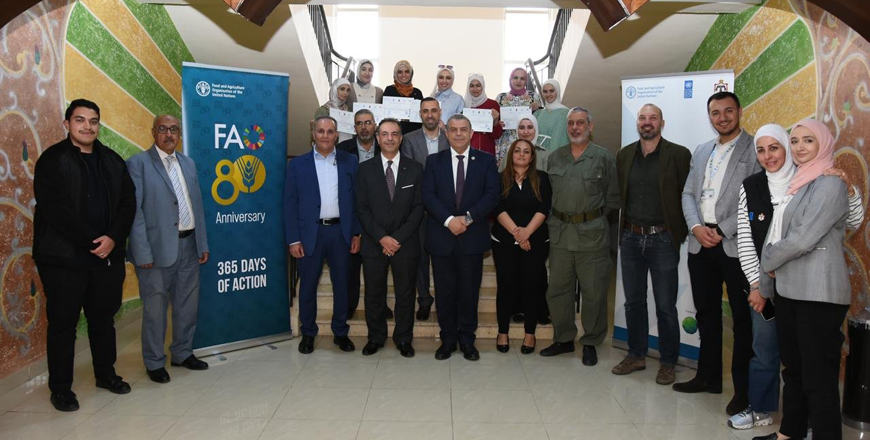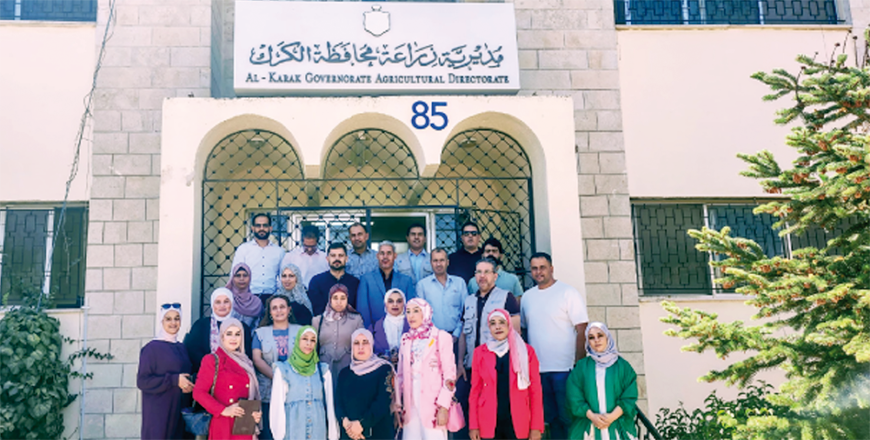You are here
FAO, Mutah University sign agreement to train women in climate change adaptation
By JT - Dec 03,2023 - Last updated at Dec 03,2023

Nabil Assaf, Representative of FAO in Jordan and Muhammad Daoud Al Majali, vice president for Academic Affairs at Mutah University during the signing of the agreement on Sunday (Photo courtesy of FAO Jordan)
AMMAN — The Food and Agriculture Organisation of the United Nations (FAO) in Jordan and Mutah University on Sunday signed an agreement where the university is to provide technical services to the FAO headquarters in Amman.
Under the agreement eight women will be trained in the field of climate change adaptation to become “Climate Wise Women Agents”, according to a statement from FAO Jordan.
The agreement was signed by Nabil Assaf, Representative of FAO in Jordan and Muhammad Daoud Al Majali, vice president for academic affairs at Mutah University.
The agreement is within the framework of “Building resilience to cope with climate change in Jordan through improving water use efficiency in the agriculture sector” project (BRCCJ), which is funded by the Green Climate Fund and implemented by FAO in Jordan through the Ministry of Water and Irrigation, the Ministry of Agriculture, the Ministry of Environment and the United Nations Development Programme.
The project aims to build climate change resilience in Jordan by improving water use efficiency in the agriculture sector to help Jordan adapt to climate risks and change behaviour towards more efficient use of water resources, transfer knowledge and strengthen the capacity of communities and institutions in Jordan, water sustainability and respond to the needs of vulnerable groups, the statement said.
During signing the agreement, Assaf stated that “FAO is implementing several projects in Jordan that include investing in women as drivers of solutions and agents of change, the most important of which is the BRCCJ project, which includes several activities, including the activity of establishing a cadre of climate wise women to be agents of change in the field of climate change adaptation”.
“As an important part of the implementation of this activity, FAO is honoured today to sign the agreement with Mutah University with the aim of obtaining technical assistance to develop a training manual on climate change adaptation and train eight agricultural engineers over a period of six months to become trainers specialised in training women on climate change adaptation, within the framework of establishing a cadre of a further 400 climate wise women to become agents of change in the field of climate change adaptation in the four project governorates [Madaba, Karak, Tafila and Ma’an],” Assaf added.
Majali said: “This project reflects a true partnership between various state institutions, FAO, and the United Nations Development Programme to coordinate national efforts concerned with climate change, stressing the importance of Jordan’s development partners, including United Nations agencies, continuing to support Jordan to enable it to meet international obligations related to addressing climate issues and reach the goals set in accordance with the strategies, plans and policies adopted by the Jordanian government under the directives of His Majesty King Abdullah.”
He added: “Mutah University emphasises that this project will open new opportunities and horizons in priority areas, namely: Agriculture, water and environment, in addition to including a component for training women in rural areas to make them pioneers of change in the field of water use.”
The BRCCJ project, with a fund of $33.25 million is currently being implemented in the four targeted governorates in the Dead Sea Basin — Karak, Madaba, Tafila and Ma’an — that are particularly vulnerable to climate change and water stress caused by climate change.
The people of these areas are highly dependent on rain-fed agriculture, rural poverty rates are high and residents require improved information and resources to adapt to climate change.
As agents of change for climate change adaptation, women play a key role in project activities that reflect a gender-responsive approach to climate-smart agriculture, enhancing women’s access to resources and information that will enable them to adapt to climate change, protect their livelihoods and ensure their well-being, the statement read.
Related Articles
AMMAN — The Food and Agriculture Organisation of the United Nations (FAO) in Jordan, in cooperation with Mu’tah University, on Wednesday cel
AMMAN — The Food and Agriculture Organisation (FAO) and Mutah University's Prince Feisal Dead Sea Research Centre launched a training course
KARAK — The Food and Agriculture Organisation of the United Nations in Jordan (FAO), in cooperation with the Ministry of Agriculture, launch













